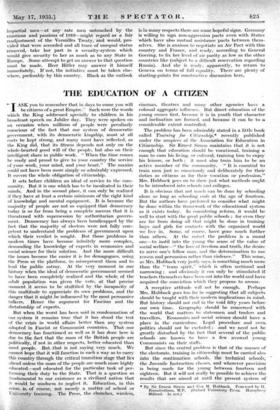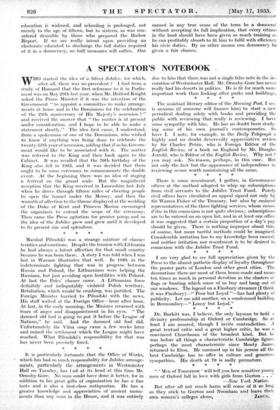THE EDUCATION OF A CITIZEN
".j. ASK you to remember. that in days to come you will JL be citizens of a great Empire.'" Such were the words which the King addressed specially to children in his broadcast speech on Jubilee day. They were spoken on an occasion when millions of people were peculiarly conscious of the fact that our system of democratic government, with its democratic kingship, must at all costs be kept strong, and many must have reflected, as the King did, that_ its fitness depends not only on the whole-hearted good will of the people, but also on their intelligent share in public work. " When the time comes be ready_ and proud to give to your country the service of your work, your mind, and your heart." The maxim could not have been more simply or admirably expressed. It covers the whole obligation of citizenship. __, • It sets before children an ideal of service to the com- munity. But it is one which has to be inculcated in their minds. And in the second place, it can only be realized if they, have at least a certain minimum of the right kind of knowledge and mental equipment. It is because the majority of .people are not so equipped that democracy today is so far from being a complete success that it is threatened with supersession by authoritarian govern- ment. Democracy has always been handicapped by the fact that the majority of electors were not fully com- petent to understand .the problems of. government upon which their. verdict is sought. But those problems in modern times have become infinitely more complex, demanding the knowledge of experts in economics and social science for their solution. And the more difficult the issues become the easier it is for demagogues, using the Press or the platform, to misrepresent them and to lead the public astray. At the very moment in our history when the ideal of democratic government seemed to have been completely realized and the, whole., of the adult. popilition was. giyen the vote, at that precise moment. it seems to be stultified by the - incapacity of this multitude-to appreciate its own _problems, and .the danger that it might,* influenced by the most persuasive talkers. Hence the argument for Fascism and the dictatorship of experts...
• But when the worst has been said in_ condemnation of our, system it remains true that it • has stood the test of the crisis in world affairs better than any system' adopted .in Fascist or Communist countries. That our democracy has functioned as well as it has done here iS due to the fact .that the mass of the British people are politically, if not in other respects, better, educated than most, people. But that is not saying_ very much. We cannot hope that function in such a way as to carry this country through the critical transition stage that lies ahead unless the mass of the people are much more highly educate&—and educated for the particular task of per- forming their duty to the State. That is a question so fundamental to our . existence as a civilized nation that it would be madness to neglect it. Education, in this sense, is, of course, not merely a .matter • of school or University training. The Press, the churches, wireless, cinemas, theatres and many other agencies have a colossal aggregate influence. But direct education of the young comes first, because it is in youth that character and inclination are formed, and because it can be to a considerable extent controlled.
The problem has been admirably stated in a little book called Training for Citizenship,* recently published under the auspices of the Association for Education in _Citizenship. Sir Ernest Simon maintains that it is not enough that education should be vocational, training a man to earn his living, or cultural, training him to enjoy his leisure, or both ; it must also train him to be an active member of the community. " It is essential to train men just as consciously and deliberately for their duties as citizens as for their vocation or profession." Mrs. Hubback goes on to show just what methods ought to be introduced into schools and colleges.
It is obvious that not much can be done by schooling alone so long as schooling ends at the age of fourteen. But the authors have preferred -to consider what might be done within the framework of the educational system as it exists today. In considering reform, it would be well to start with the great public schools ; for even they are far from doing all that might be done in training boys and girls for contacts with' the organized world We live in. Some, of course, have gone much further than others. At the outset the problem is a moral 'one—to instil into the young the sense of the value of social welfare—" the love of freedom and truth,-the desire to serve one's fellow man, and the determination to use reason and persuasion rather than violence." This sense, as Mrs. Hubback very justly says, is something much more than the " team spirit," which is often sectional and narrowing ; and obviously it can only be stimulated if teachers themselves have been out into the world and have acquired the conviction which they propose to arouse.
A receptive attitude will not be enough. Perhaps Mrs. Hubback goes too far in suggesting that all subjects should be taught with their modern implications in mind. But history should not end in the void fifty years before our own time. Geography should be concerned with the world that matters to statesmen and traders and travellers. Economics and social science should have a plate • in' the curriculum. - Legal procedure and even. politics should not be excluded ; and we need not be greatly disturbed by the fact that several of the public Schools . are known to have a few avowed young Communists on their staffs.
But since the central problem is that of the masses of the electorate, training in citizenship must be carried also into the continuation schools, 'the technical schools; the Juvenile Instruction classes, and wherever provision is being made for the young between fourteen and eighteen. But it will not really be possible to achieve the results that are aimed at until the present system of * By, Sir , Ernest Simon Gni Eva M. Hubback. Foreword by H. Ramsbotham, M.P. (Oxford University Press. Humphrey Milford. Is. nat.) education is widened, and schooling is prolonged, not merely to the age of fifteen, but to sixteen, as was con- sidered desirable by those who prepared the Hadow Report. If we are really intent upon providing an electorate educated to discharge the full duties required of it in a democracy, no half measures will suffice. One cannot in any true sense of the term be a democrat without accepting its full implication, that every citizen in the land should have been given as much training as he can profitably absorb to fit him to fulfil with efficiency his civic duties. By no other means can democracy be given a fair chance.











































 Previous page
Previous page